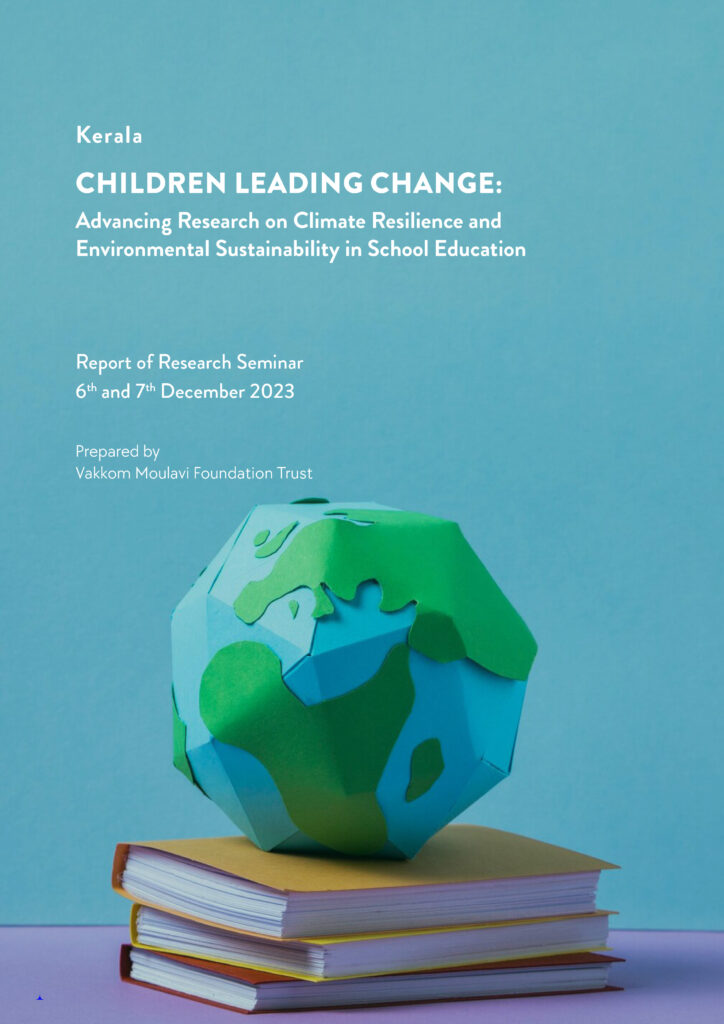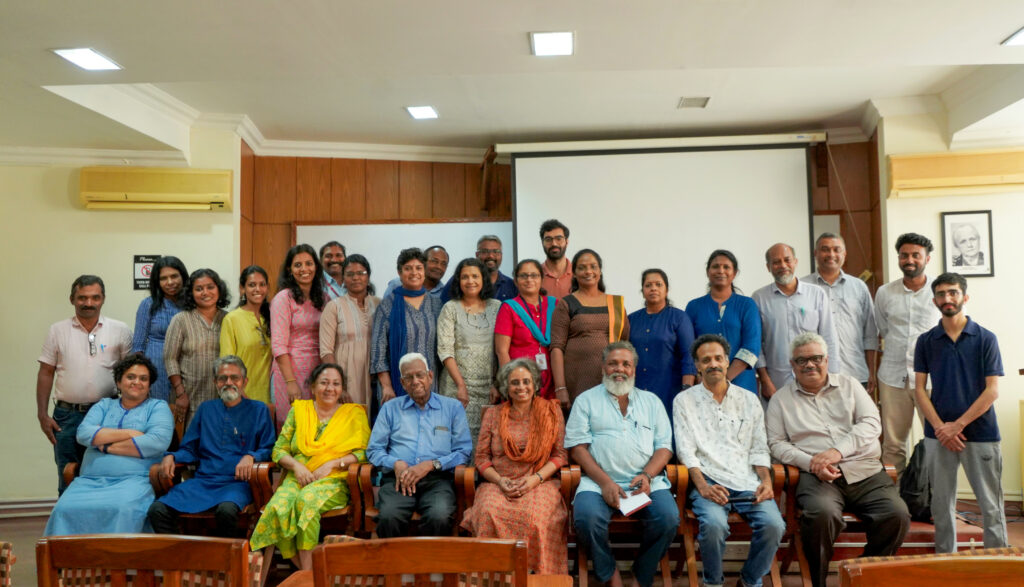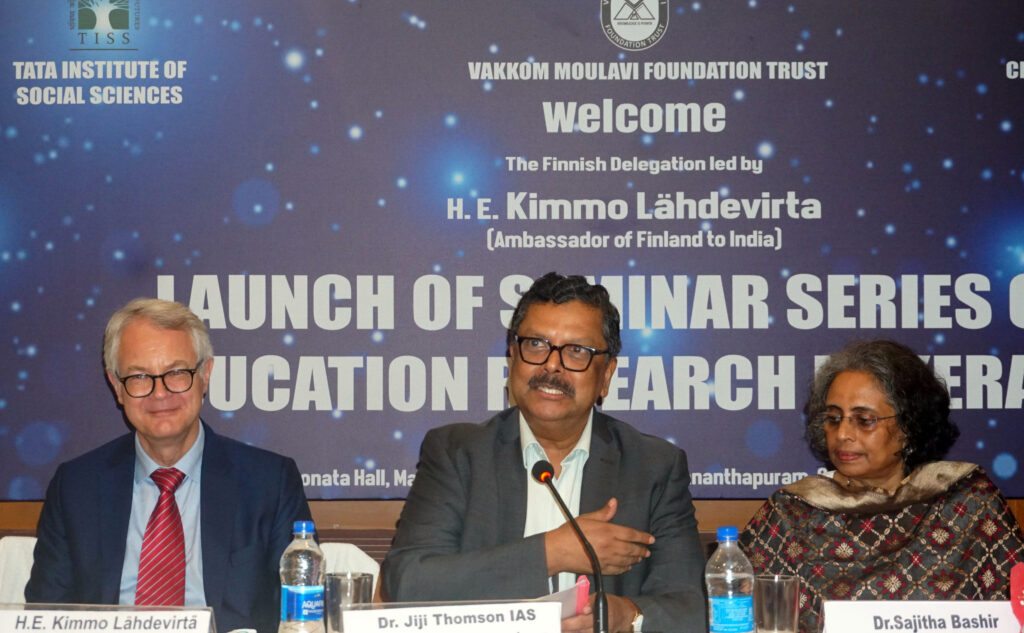
Climate change is a pressing topic for education scholars and practitioners throughout the world.
In Kerala, India, a GINTL partner coalition recently started developing a research agenda for locally relevant climate change education.
The coalition is formed between Vakkom Moulavi Foundation Trust (VMFT), which is a civil society organization, and the following academic institutions in India: Centre for Development Studies (CDS) Kerala, and the School of Educational Studies, Tata Institute of Social Sciences, Hyderabad (TISS). GINTL is participating in some of their activities as a research collaborator.
The coalition has now published a seminar report, which outlines some of their key ideas for a research agenda. You can read about them below, or download the complete seminar report and its executive summary.
The report Children Leading Change is an outcome of a two-day seminar, which was organised in Thiruvananthapuram, the capital of Kerala on 6 and 7 December, 2023. The seminar focused on education research for climate resilience and environment sustainability and the participants included university faculty, teachers, researchers, the media, and government officials.

The research seminar was part of a broader seminar series, which was officially launched on October 19, 2023 by the Ambassador of Finland to India, H.E. Kimmo Lähdevirta, together with VMFT, CDS and TISS, educators from Kerala and senior education researchers from Finland. The launch event was organized in the context of the visit of the Honorable Minister of Education for Finland, Anna-Maja Henriksson, to Kerala.

GINTL contribution: proposing a shift from sustainability to planetary well-being
Senior lecturer Heidi Layne from University of Jyväskylä contributed to the seminar by giving a presentation on planetary well-being in education. The term refers to the highest attainable standard of well-being for human and non-human beings and their social and natural systems (Antó et al., 2021). Her presentation included overview of the planetray well-being courses in the University of Jyväskylä and how the sustainability is included (or not) in the four teacher education programs in Finland: University of Lapland, Jyväskylä, Tampere and Helsinki.
Heidi Layne spoke along with three other presenters who contributed with diverse viewpoints on climate change education from around the world, namely Radhika Iyengar, Director, Centre for Sustainable Development, Columbia University; Raphaelle Martinez, Education Policy and Learning Team, Global Partnership for Education (GEP); and Ramachandra Rao Begur, Senior Education Specialist at UNICEF.
Layne’s research team is also partnering with the Kerala coalition on a research project that focuses on the role of teachers in tackling climate crises in Kerala. Ghana, and Finland. The study site in Kerala is a coastal area highly vulnerable to climate change. Part of the GINTL research funding has enabled the Kerala coalition to hire a local research assistant for facilitating interviews.
Collaboration in statistical analysis
In addition to Layne’s team, another small team of GINTL funded researchers from University of Jyväskylä (Eija Pakarinen and Tuomo Virtanen) is collaborating with VMFT. They are conducting statistical analysis of inequalities in education (participation, attainment and learning outcomes) related to school management and medium of instruction. The outputs will include a research article in a peer reviewed journal and a non-technical report for a broader audience of educators, policy makers, media and families.
The Kerala list of ideas for setting a locally relevant research agenda for climate change education
At the end of the seminar, a panel discussion – together with observations from seminar participants – crystallised several ideas on how to go about setting an agenda for meaningful research on climate change education in Kerala. The following critical themes for research were outlined:
- Undertake a deep and ‘thick’ descriptive picture of the state of the schooling system in Kerala using quantitative data such as UDISE, NSS and other datasets. Such studies are needed to understand the segmentation in the school system along various divides and, to highlight the broad trends that are occurring in the system. Such studies can throw up insights and hypotheses for further analysis. They enable a more nuanced understanding of the ground realities and policy discussions should be based on sound empirical data.
- For a deeper understanding, primary surveys are needed to gauge time-use patterns and what exactly is happening in classrooms and, whether constructivist methods are being followed or not. We need to understand if schools have a connection with the community or not. Ethnographies and surveys can come in handy in understanding these issues. Auto-ethnographies as a method can be used by teachers to document perspectives and challenges they face in teaching in schools. It is also important to build a theory of education in Kerala.
- We need to develop theories of what is happening in our education system which will also enable us to grapple with the appropriate approach to climate change education. There is also a need to do a detailed critical review of existing practices and schema of education. It will also result in framing better policies and developing focused empirical research.
- Undertaking a textual analysis of the existing curriculum will provide a solid foundation for developing a better climate change education framework. A comparative analysis of the curriculum between Kerala and Finland, which has introduced the concept of ‘Planetary Well-being’ into its education system could provide useful insights. Participation from DIETs could be helpful in this regard.
- Comprehensive studies of teacher development programs are needed to understand whether teachers are equipped to impart climate change education. This should include studies at two levels — in-service and pre-service programs. Funding for such studies could possibly be leveraged from DIETs through negotiations.
- There is a need to generate discourse around climate change based on strong theorization. This discourse must have the potential to attract and engage youth to understand climate change issues. As a concrete step, a website which has resources around climate change would be very useful in developing this discourse. It is important to build social knowledge concerning the human body and ethical living. Audio-visual resources need to be generated to direct more attention towards climate change action.
- An audit of existing school infrastructure in the state needs to be undertaken to test their climate resilience. This can be done using student journalists who can be asked to review their school infrastructure. Media houses could possibly incentivize such stories through appreciation and prizes.
***
Aaltonen, V. A., Hiljanen, M., Layne, H., Lehtonen, A., Löyttyniemi, M., Mykrä, N., Virtanen, A. S., & Heikkinen, H. L. (2024). Education for planetary well-being. In M. Elo, J. Hytönen, S. Karkulehto, T. Kortetmäki, J. S. Kotiaho, M. Puurtinen, & M. Salo (Eds.), Interdisciplinary Perspectives on Planetary Well-Being (pp. 246-258). Routledge. https://doi.org/10.4324/9781003334002-24
Antó, J.M., Martí, J.L., Casals, J., Bou-Habib, P., Casal, P., Fleurbaey, M., Frumkin, H., Jiménez-Morales, M., Jordana, J., Lancelotti, C. and Llavador, H., 2021. The planetary wellbeing initiative: pursuing the sustainable development goals in higher education. Sustainability, 13(6), p.3372













